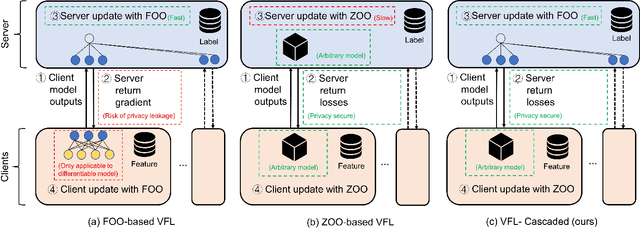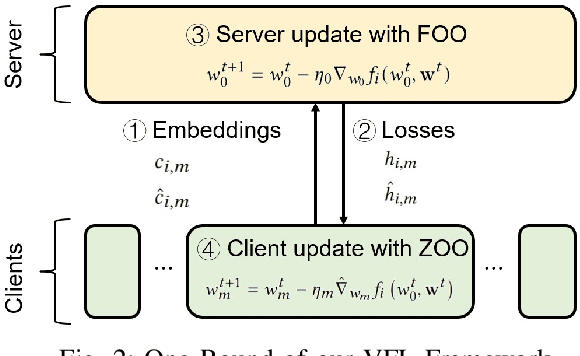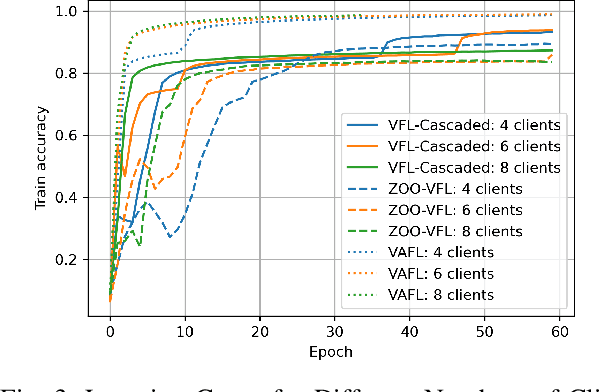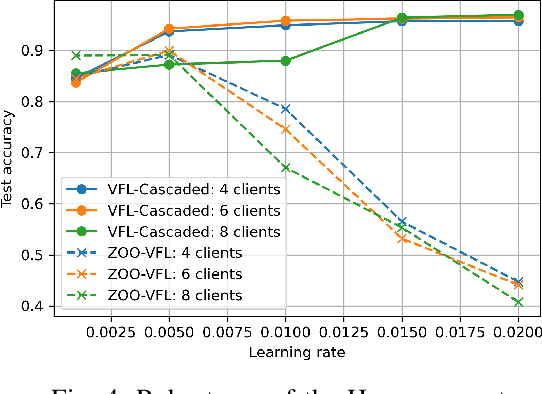Qingsong Zhang
Secure and Fast Asynchronous Vertical Federated Learning via Cascaded Hybrid Optimization
Jun 29, 2023



Abstract:Vertical Federated Learning (VFL) attracts increasing attention because it empowers multiple parties to jointly train a privacy-preserving model over vertically partitioned data. Recent research has shown that applying zeroth-order optimization (ZOO) has many advantages in building a practical VFL algorithm. However, a vital problem with the ZOO-based VFL is its slow convergence rate, which limits its application in handling modern large models. To address this problem, we propose a cascaded hybrid optimization method in VFL. In this method, the downstream models (clients) are trained with ZOO to protect privacy and ensure that no internal information is shared. Meanwhile, the upstream model (server) is updated with first-order optimization (FOO) locally, which significantly improves the convergence rate, making it feasible to train the large models without compromising privacy and security. We theoretically prove that our VFL framework converges faster than the ZOO-based VFL, as the convergence of our framework is not limited by the size of the server model, making it effective for training large models with the major part on the server. Extensive experiments demonstrate that our method achieves faster convergence than the ZOO-based VFL framework, while maintaining an equivalent level of privacy protection. Moreover, we show that the convergence of our VFL is comparable to the unsafe FOO-based VFL baseline. Additionally, we demonstrate that our method makes the training of a large model feasible.
Desirable Companion for Vertical Federated Learning: New Zeroth-Order Gradient Based Algorithm
Mar 19, 2022



Abstract:Vertical federated learning (VFL) attracts increasing attention due to the emerging demands of multi-party collaborative modeling and concerns of privacy leakage. A complete list of metrics to evaluate VFL algorithms should include model applicability, privacy security, communication cost, and computation efficiency, where privacy security is especially important to VFL. However, to the best of our knowledge, there does not exist a VFL algorithm satisfying all these criteria very well. To address this challenging problem, in this paper, we reveal that zeroth-order optimization (ZOO) is a desirable companion for VFL. Specifically, ZOO can 1) improve the model applicability of VFL framework, 2) prevent VFL framework from privacy leakage under curious, colluding, and malicious threat models, 3) support inexpensive communication and efficient computation. Based on that, we propose a novel and practical VFL framework with black-box models, which is inseparably interconnected to the promising properties of ZOO. We believe that it takes one stride towards designing a practical VFL framework matching all the criteria. Under this framework, we raise two novel {\bf asy}nchronous ze{\bf r}oth-ord{\bf e}r algorithms for {\bf v}ertical f{\bf e}derated {\bf l}earning (AsyREVEL) with different smoothing techniques. We theoretically drive the convergence rates of AsyREVEL algorithms under nonconvex condition. More importantly, we prove the privacy security of our proposed framework under existing VFL attacks on different levels. Extensive experiments on benchmark datasets demonstrate the favorable model applicability, satisfied privacy security, inexpensive communication, efficient computation, scalability and losslessness of our framework.
AsySQN: Faster Vertical Federated Learning Algorithms with Better Computation Resource Utilization
Sep 26, 2021



Abstract:Vertical federated learning (VFL) is an effective paradigm of training the emerging cross-organizational (e.g., different corporations, companies and organizations) collaborative learning with privacy preserving. Stochastic gradient descent (SGD) methods are the popular choices for training VFL models because of the low per-iteration computation. However, existing SGD-based VFL algorithms are communication-expensive due to a large number of communication rounds. Meanwhile, most existing VFL algorithms use synchronous computation which seriously hamper the computation resource utilization in real-world applications. To address the challenges of communication and computation resource utilization, we propose an asynchronous stochastic quasi-Newton (AsySQN) framework for VFL, under which three algorithms, i.e. AsySQN-SGD, -SVRG and -SAGA, are proposed. The proposed AsySQN-type algorithms making descent steps scaled by approximate (without calculating the inverse Hessian matrix explicitly) Hessian information convergence much faster than SGD-based methods in practice and thus can dramatically reduce the number of communication rounds. Moreover, the adopted asynchronous computation can make better use of the computation resource. We theoretically prove the convergence rates of our proposed algorithms for strongly convex problems. Extensive numerical experiments on real-word datasets demonstrate the lower communication costs and better computation resource utilization of our algorithms compared with state-of-the-art VFL algorithms.
Secure Bilevel Asynchronous Vertical Federated Learning with Backward Updating
Mar 01, 2021



Abstract:Vertical federated learning (VFL) attracts increasing attention due to the emerging demands of multi-party collaborative modeling and concerns of privacy leakage. In the real VFL applications, usually only one or partial parties hold labels, which makes it challenging for all parties to collaboratively learn the model without privacy leakage. Meanwhile, most existing VFL algorithms are trapped in the synchronous computations, which leads to inefficiency in their real-world applications. To address these challenging problems, we propose a novel {\bf VF}L framework integrated with new {\bf b}ackward updating mechanism and {\bf b}ilevel asynchronous parallel architecture (VF{${\textbf{B}}^2$}), under which three new algorithms, including VF{${\textbf{B}}^2$}-SGD, -SVRG, and -SAGA, are proposed. We derive the theoretical results of the convergence rates of these three algorithms under both strongly convex and nonconvex conditions. We also prove the security of VF{${\textbf{B}}^2$} under semi-honest threat models. Extensive experiments on benchmark datasets demonstrate that our algorithms are efficient, scalable and lossless.
 Add to Chrome
Add to Chrome Add to Firefox
Add to Firefox Add to Edge
Add to Edge